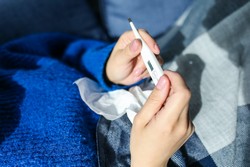As the COVID-19 pandemic continues into flu season, health officials are emphasizing safety precautions to reduce the spread of both respiratory diseases.
“It is extremely important to be protected against flu this year as influenza can greatly impact your immune system, making you more vulnerable to other viral illnesses such as COVID,” wrote Director of Health Services, Kathy Maloney, in an email.
“It is definitely more important than ever with COVID-19 around to get a flu vaccine,” said Jeffrey Weisburg Ph.D., Specialist Professor of Biology. “Being infected with both viruses could be catastrophic to an individual’s immune system and health.” Weisburg said that the only members of the community who should not receive a flu vaccine are those who experience an allergic reaction from it.
While the influenza circulates all year, flu season occurs in the fall and winter, peaks between December and February, and can last until May, according to the Centers for Disease Control and Prevention (CDC). The CDC recommends that people receive their flu vaccine in September or October.
“I do not think that COVID-19 is going anywhere for the foreseeable future and will be here throughout the entire flu season,” said Weisburg. “I am hopeful since everyone should be wearing a mask, social distancing, and washing his/her hands constantly that the flu season will not be as bad as usual, but the way this year has gone, it probably will be a horrible flu season.”
Both respiratory viruses are spread through infected droplets and particles in the air, according to John Hopkins Medicine. Since both viruses have similar symptoms such as fever, cough, and congestion, it might be difficult to discern between the two unless a test is administered. It is also possible to contract both viruses at the same time.
According to John Hopkins Medicine, it is difficult to predict how severe a flu season will be, since there are several different flu viruses around that mutate from year to year. Their website also states that while more research is needed, experts believe that the death rate of COVID-19 could be 10 or more times higher than most flu strains.
Weisburg said that for students and faculty to protect themselves from both the flu virus and COVID-19 this fall and winter, they should receive seven or more hours of sleep, exercise, and eat healthily, which all contribute to a strong and healthy immune system.
“I cannot stress the importance of wearing a mask and social distancing especially around people you are not 100 percent sure do not have COVID-19 even when outside,” he said. “You can see why when you look at Monmouth University’s dashboard. Those numbers went from six to 199 in less than two weeks.”
Alyssa Bogan, a senior health studies student, has had experience testing COVID-19 patients while working at a primary care physician’s office as a certified medical assistant for the past four months. She said, “I see patients every day who are scared to come in for fear of catching it, and it is part of my job to do intake and vitals on potential COVID patients.”
She continued, “I am definitely concerned because if it makes a resurgence our hospital systems will be easily overwhelmed between COVID and flu patients. The rise in cases at Monmouth is concerning as well because it shows we as a campus are not doing enough.”
Weisburg commented on the increase in cases at Monmouth, saying, “…Parties are such a terrible idea even if they are with the legal amount of people. You are eating or drinking, not wearing a mask, and probably yelling over the noise or singing with the music. Not to mention, doing all of this inside. All of these are a bad recipe to spread the infection quite easily.”
PHOTO TAKEN by Polina TankilevitcH




